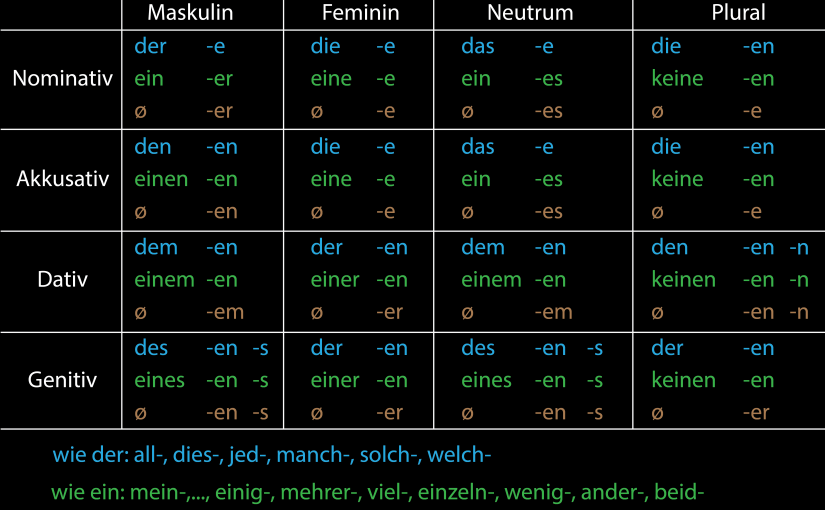German is a more complex language than English. I have been trying to learn enough German in the hope to write this post in German or a post in German, but alas, that day may come in the still distant future.
The image above shows the variation of articles and adjectives endings (and some noun endings) in German, which is one of the main chief culprits for the complexity of German. All the nouns are classified into the masculine, feminine, or neutral categories. They all have different definite (der, die, das, die) and indefinite articles (ein, eine, ein, keine). Moreover, depending on the case of a noun in a sentence (nominative, accusative, dative, or genitive), the forms of definite and indefinite articles change. Finally, the adjectives and some nouns following the adjectives will change their endings too.
This is just to give you a taste of the complexity of German grammar, as compared with English. After a while, one gets used to these grammar rules. Native German speakers, like native English speakers, don’t think about the rules while they speak. If it doesn’t sound right, then something is wrong. Just like English, or for that matter, any language.
Learning German is an interesting experience for me; it reminds me of the days and the drills of learning English. For all of its complexity, going from English to German is a small step, as compared with going from Chinese to English. The backbone of its grammar is still similar to English, just with an added layer of variations and many exceptions to rules. There are multiple occasions when I just have to remind myself that just stop questioning and just start trying to memorize.
Every once in a while, I question myself, what’s the point of learning German? Especially given the fact that the most spoken sentence for me is “Koennen Sie Englisch sprechen? ” (Do you speak English?)
One Saturday, as I was preparing to leave my apartment for shopping, two Germans knocked on my door, and when the door was opened, they started immediately speaking mandarin to me. As we chatted more, I learned that they are missionaries from a local church, and they work mostly with the Chinese people in the church. I was stunned by the level of fluency in which they spoke. There was immediate goodwill towards them, something that would not happen if they spoke to me in English. Even though I didn’t end up going to the church, the goodwill has remained.
Reflecting on this particular experience, I think trying to speak in a foreign language to its native speakers indicates an interest in the culture it represents and the people in it. It shows an effort to understand the culture and the people, and it is a genuine sign of respect.
